it is saturday and i am sitting in sophia's hotel room and thinking about the last 6 days! a t 2pm i will be on the flight back to frankfurt, where hopefully my little girl and my husband will wait for me!
this was a very short time in india and even for bangalore it was not enough, but it was filled with hundreds of experiences! the theatre "ranga shankara" was such a beautiful place where i felt very comfortable! also the festival "aha" was really well organised ! we had enough time for reharsels and to build up our stage ! there where lots of great volenteers who helped us with everything !

and it didn't matter if we needed a help with a spotlight or a nice shopping tour through bangalore! even our performances where such nice experiences ! i was very exited to perform in front of so many indian children and on top of that my english is not the best ! the space was very big, so normally we perform in front of 30 children and now in one show there were around 150 people! so it was big fun ! the shows very well and i really enjoyed myself and had the feeling that there is a really open minded audience in bangalore! after the shows a lot of people came to me and asked me questions or told me that they liked it very much and the children came to me on the stage and said thank you and told me their names!

the city of bangalore is a really big town and has two different worlds, one is very rich and similar to ours but on the other side you have poverty and pollution! for example: you buy a south indian meal (which is a lot to eat, see picture below) in a local restaurant and you pay 20 rupees and in the evening you go to a upper class night club and you pay 300 rupees for a beer!
the food is very nice but for me it's all a bit similar in taste! you have different types of dosa, which are some kind of pancakes with vegtables, potatos and some nice dips! it can be very hot! but the best thing is, my stomach is feeling fine! one thing that makes me really laugh are the homeless cows everywhere! they walk between the cars and the rikshas, it is unbelievable!
so now i am very rich of experience and hope i will visit this place again!
me in the mouse costume with arundhati


















